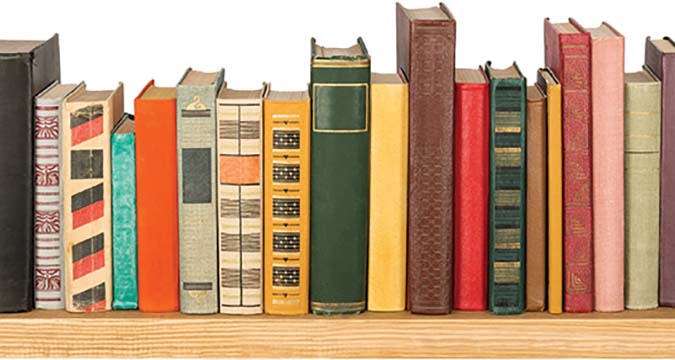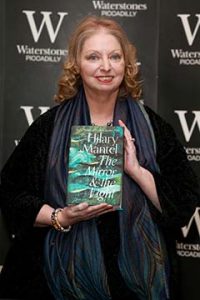

Nearly three years ago, the Settle and District Community News was kind enough to publish an article I wrote on two historical novels by Hilary Mantel – Wolf Hall (2009) and Bring Up the Bodies (2012) – both of which deal with Henry VIII’s chief fixer, Thomas Cromwell. Each won a Booker Prize – a truly remarkable achievement. No writer had ever won a Booker with two novels in the same series, and no woman writer had ever achieved two Bookers. Happily, public recognition deservedly followed, and Hilary Mantel became Dame Hilary in 2014.
 Having first reckoned that Thomas Cromwell’s life would require two novels, she began to realise that he would need a third, and in 2020 that third book duly emerged – The Mirror and The Light. For me, reviewing The Mirror and The Light completes unfinished business. But two other events have given me an additional push. The first, sadly, is Hilary Mantel’s death from a stroke in September last year at the age of seventy. The second is the BBC’s recently intention to televise The Mirror and The Light, which, if it is a good as its treatment of Wolf Hall, will be a worthy tribute to its author.
Having first reckoned that Thomas Cromwell’s life would require two novels, she began to realise that he would need a third, and in 2020 that third book duly emerged – The Mirror and The Light. For me, reviewing The Mirror and The Light completes unfinished business. But two other events have given me an additional push. The first, sadly, is Hilary Mantel’s death from a stroke in September last year at the age of seventy. The second is the BBC’s recently intention to televise The Mirror and The Light, which, if it is a good as its treatment of Wolf Hall, will be a worthy tribute to its author.
The Mirror and The Light starts and ends with a beheading: it opens in 1536, moments after the execution of Anne Boleyn, and closes in 1540, with Cromwell’s own head on the block. Each scene is portrayed not in buckets of blood and pain but obliquely, in a manner both unexpected and memorable. While Anne Boleyn’s women gather up her remains and look for somewhere to put them (an arrow-chest had to suffice) the menfolk shuffle about, unsure what to say or whether to go off for breakfast. Four years later comes Cromwell’s decapitation. The last we read of him is not the awful act (it took three blows to sever his head) but what his mind plays back – the Mirror of the book’s title – as he mounts the scaffold. As he emerges from his cell in the Tower, the Light is the morning sunlight that dazzles him. Few authors have the imagination to write such horrors from such unusual perspectives.
During the four years between 1536 and 1540 Thomas Cromwell reached dizzy heights as reward for his unfailing services to Henry VIII, then fell precipitously to disgrace and death for failing. The son of a Putney brewer and blacksmith, Master Cromwell becomes head of Henry’s Privy Council, then Lord Privy Seal, then Henry’s Vicegerent in church affairs, and finally Earl of Essex. That he was so effective, and that he rose so high from such base origins angered the established noble families at the snake-pit that was Henry’s court. They remained ever watchful for means of bringing Cromwell down, and when Henry’s marriage to Anne of Cleves, which Cromwell had helped to engineer, disappointed the ageing tyrant, they seized their chance.
For all its meticulous accuracy, The Mirror and The Light is leavened, where Mantel feels it necessary, with characters drawn from her imagination. We meet Cromwell’s cook, Thurston, and admire his gruff devotion to Cromwell, right down to the last repast of his master’s life. We meet too Cromwell’s French servant, Christophe, who, raised from nothing and equally devoted, is often downright funny, his wit showing up to disadvantage the plodding intellects of the grandees – the ambassadors, dukes, earls and bishops with whom Cromwell has to do business. We also meet Cromwell’s daughter, Jenneke, from an affair he had in Flanders in his younger years; and Dorothea, the daughter of Cardinal Wolsey (!) who spits venom at Cromwell for an stubborn but entirely mistaken belief that it was he who brought her father down. These characters, no less than their authenticated opposites, serve to hold up a mirror (there you go – mirrors again) to the colourful, brutal, malodorous Tudor England into which Mantel immersed herself for over a decade.
If The Mirror and The Light did not win a third Booker prize, is it the equal of Wolf Hall and Bring Up The Bodies? In my view, and not only mine, it certainly is. Not only that, it seems to me astonishing that someone with a less than ideal education (Mantel described her upbringing in a Catholic school as “childminding with violence”), trained not as a writer but as a lawyer, beset with chronic ill health (“perpetually at war with my own body”) should go on to write the most accomplished and sustained work of historical fiction of our time. She was, as she has been described, “ferociously intelligent” but that doesn’t begin to sum her up. She had imagination, sensitivity, unflinching respect for historical truth, immense single-mindedness, and an ability with the English language which borders on the magical.
And so to the BBC. It has already made The Mirror and The Light available in abridged form on BBC Sounds, but fans of Hilary Mantel will surely be eager to see the intended televised version. No date has been announced, but the part of Thomas Cromwell will again be played by Mark Rylance, and the series will again be produced by Peter Kosminsky, who so successfully masterminded Wolf Hall. Don’t miss it! But while you’re waiting, do read the book.
By Bob Young



